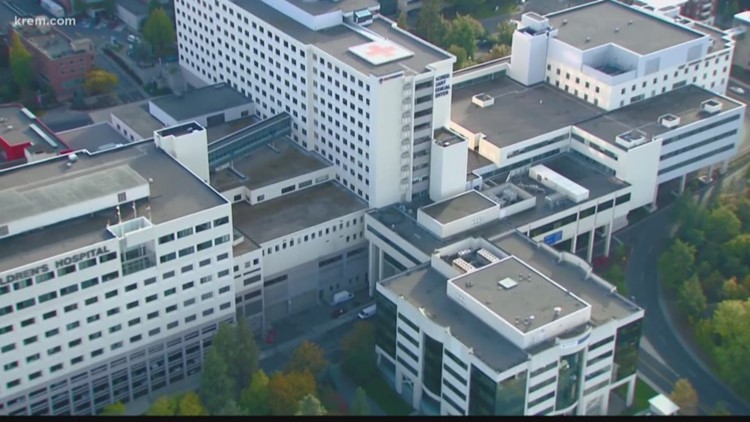SPOKANE, Wash. — Governor Jay Inslee released an Emergency Proclamation in March regarding a mental health crisis among Washington children and youth.
The proclamation highlighted a sharp increase in mental health visits among children. The governor then listed hospitals seeing particularly high numbers.
Providence Sacred Heart Medical Center is at the top of the list with the steepest increase of acute care admissions across the state.
When compared to 2019, Sacred Heart has seen a 73% increase in admissions into their Inpatient Adolescent Psychiatric Unit.
Sacred Heart also saw a 68% increase in admissions into the General Pediatric Floor when compared to last year.
"At nearly every data point, Sacred Heart Children’s Hospital in Spokane has reported a substantial increase in pediatric patients with behavioral health diagnoses as a primary concern during COVID-19," Inslee said in his proclamation.
The proclamation cites the coronavirus pandemic as a contributing factor to the increase in significant mental and behavioral health crisis in Washington youth.
The impact of online learning
The governor's proclamation says online learning contributed to continued isolation and lack of resources for some children.
It mentioned findings from the Center for Disease Control and Prevention which noted numerous benefits of schools that go beyond education.
It lists school meal programs as one benefit provided to students. Another benefit listed by the CDC is social, physical, behavioral and mental health services provided by schools.
The proclamation states that schools "should be the last setting to close after all other COVID-19 mitigation measures have been employed and the first to reopen when they can do so safely".
Since Governor Inslee's announcement, a majority of children in Washington have returned to in-person learning.
Governor Inslee's proclamation says pediatric physicians have recently observed these trends since the physical closure of schools:
- A significant increase in youth with eating disorders, anxiety, mood disorders and depression with suicidal thoughts or self-harm behaviors
- Long wait times and limited access to mental health services for families
- LGBTQ2+ youth have specific challenges navigating limited social support, resulting in sleep disturbances, decreased physical activity, unhealthy weight gain and abuse of substances
- A significant number of previously stable youth have experienced now-onset or exacerbated eating disorders, depression, or anxiety, with some requiring increased use of medications, hospitalization, or other higher levels of care
- Children are experiencing a significant sense of isolation and loss, which is negatively impacting their learning and grades
"Although we have, for the time being, averted the crisis of overwhelming hospital capacity related to COVID-19 cases, we are in the midst of another crisis related to the mental health of many of our children," the proclamation says.
The proclamation also cited reports from the University of Washington Medicine which reported depression and anxiety as the most common diagnoses for patients under the age of 27. The study compared data from this year to 2019 and found 1,723 more patients with depression and 2,968 more patients with anxiety.
The Governor added in the proclamation, "for many Washington children, it is feared that the lack of in-person learning and other school-based supports may result in gaps in students’ learning and development that may last a lifetime."
The proclamation did clarify that the children and adolescents seen in hospitals for mental health crises are the most severe cases. The proclamation says they "represent just a small portion of the entire population of youth in Washington who are suffering from increased mental and behavioral health needs, educational setbacks and developmental concerns."
What can you do to help?
Dan Barth is the Director of Business Development for Inland Northwest Behavioral Health. He works with a state wide task force that put together a Behavioral Health Toolbox for Families that specifically discusses ways to support children and teens during the COVID-19 pandemic.
One big takeaway: children do not experience trauma the way adults do.
"You might notice those differences in the ways they talk about the event, and also in the ways they behave," the toolbox says. "Their brains do not process information and events like adult brains."
The toolbox separates the advice into age groups; toddlers and preschool children, school-age children and teens.
It includes information on common emotional responses in children and how to navigate them in a way that will help them grow stronger from the pandemic. It also provides tips for parents and adults on how to manage their own mental health during a global pandemic.



